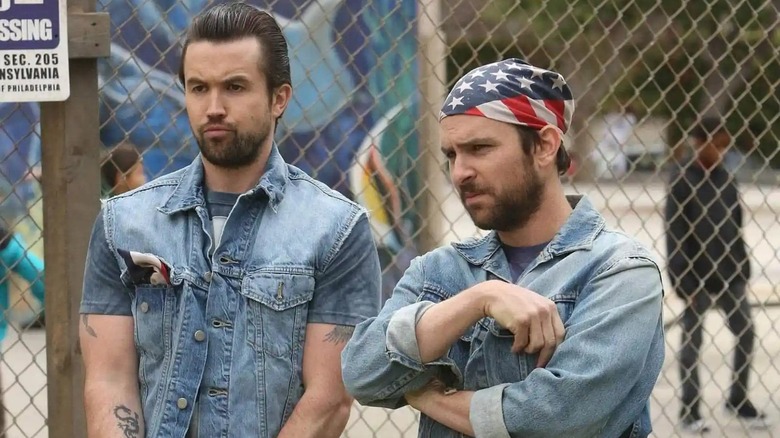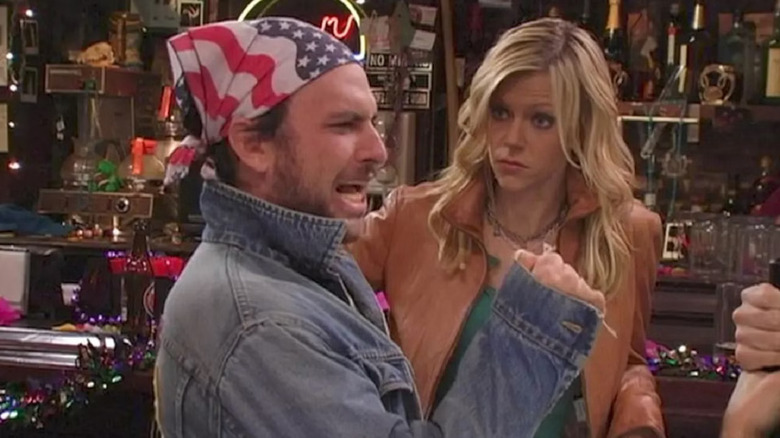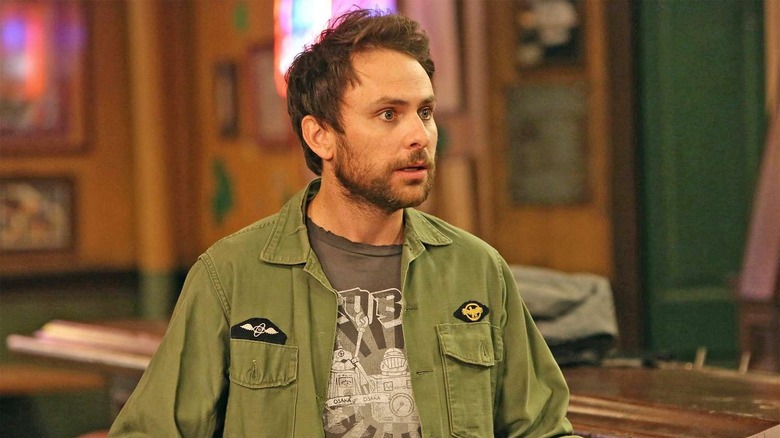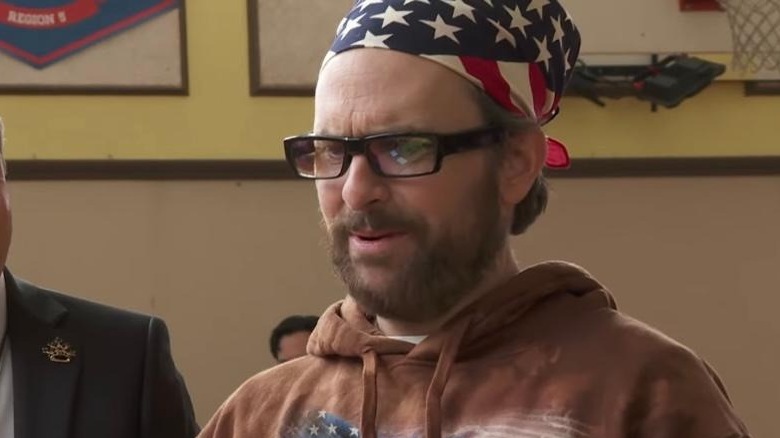The Ongoing Stereotype That Inspired It's Always Sunny's Rock, Flag, And Eagle Song
"It's Always Sunny in Philadelphia" has had some pretty unforgettable bits over the years, but some of the best moments of the show hands down are the musical numbers. There was Dee's rapping boyfriend, Dennis and Mac's glam rock band, the animated musical number in the season 4 Christmas special, and of course, there was "The Nightman Cometh." But who could forget one of the most popular songs in "Sunny" — the patriotic anthem "Rock, Flag, and Eagle."
The song was originally an inside joke between series co-creator and star Charlie Day, who stars in the show as a character named after himself, along with actor and writer David Hornsby, who plays the recurring character Rickety Cricket.
"Hornsby and I would joke about truck commercials, and that they — at that time, I don't know if they're still doing this — it seemed like they were just pumping out the most stereotypical American things," said Day, explaining the origin of the song in an episode of the "Always Sunny Podcast." "So, it was, like, Eagles and rocks and it was just like, you know. Flags [...] Drive a big truck, gonna kick some ass, whatever. So, that — I think it was just coming from there. Just, like, grabbing that riff in my head."
The tune was first sung by Day in the season 2 episode "Charlie Goes America All Over Everybody's Ass." He and Mac attempt to lean into their patriotism with an "anything goes" policy at the bar, but it quickly backfires when Frank allows a crowd of pesky Vietnamese gamblers to set up camp in the basement.
Excessively patriotic truck commercials
"Rock, Flag, and Eagle" might have been the first song that Day and Hornsby collaborated on for the series, but it certainly wasn't the last. They are also the musical minds behind the titular song in the "Nightman Cometh" musical, which was first performed in season 3. Series co-creator and star Rob McElhenney revealed the story behind Dayman to Entertainment Weekly in 2008:
"We knew we wanted to have an episode about a band. So we started questioning, 'What is the kind of the music that this band plays?' The lyrics were written by a couple of our writers, as well as Charlie, to create 'Dayman, fighter of the Nightman, champion of the sun, master of karate and friendship for everyone.' And then the music was Charlie and [co-creator and star] Glenn Howerton and another buddy of ours, David Hornsby, who plays Rickety Cricket. He had the suggestion of putting in the voice from 'Flash Gordon.' It goes, 'Flash... Ah-ahhhhhh!' That's where Dennis [Howerton] got, 'Dayman... Ah-ahhhhhh!'"
Hornsby and Day first met in 1997 after both being cast in the play "Johnny on a Spot." The "Good Girls" actor helped the "Sunny" creators shoot the show's pilot episode, but he didn't join the cast until the second season.
"I remember Charlie was like, 'Hey, do you wanna be on the show?'" Hornsby once recalled on the "Always Sunny Podcast." "'We have, like, this guest spot, you could do season 1 [...] it's not, like, that big. Do you wanna wait for something bigger?' And I was like, 'Eh, yeah, I'll wait for something bigger.'"
Day eventually offered Hornsby the part of Rickety Cricket, who began as a priest with a crush on Sweet Dee and devolved into a homeless burn victim and chronically relapsing drug addict. Through all of his phases, the character has become a bonafide staple of the series.
David Hornsby and Mary Elizabeth Ellis both collaborated with Day on the song
Day and Hornsby weren't the only members of the "Sunny" cast that played a part in writing "Rock, Flag, and Eagle." Their co-star Mary Elizabeth Ellis, who also happens to be Day's real-life wife, also had a hand in the running joke that inspired the tune.
"Mary Elizabeth [Ellis] had a really funny [riff], too," Day recalled on the "Always Sunny Podcast." "She used to joke that they would take it as far as, like, Jesus carrying the cross. And then all of a sudden, like, a truck comes up and he, like, throws the cross in the back of the truck to take himself up the hill. It was like, 'Jesus drives a Ford.' So, credit to Mary Elizabeth for that one."
Although the lyric "Jesus drives a Ford" did not make it into the official verse of "Rock, Flag, and Eagle," its inspiration can be felt in lines like "gonna climb a mountain" and "gonna rule this world."
Howerton and McElhenney, on the other hand, found the song so funny they were unable to riff on it. They couldn't even react to the song in character without breaking.
"I know for a fact that [McElhenney] and I were just laughing," Howerton added. This is why, as McElhenney pointed out, the camera does not land on either of them until after Day leaves the scene — "because we were laughing through the whole thing," the showrunner admitted.
Is the stereotype true?
So, do truck commercials really sound like "Rock, Flag, and Eagle"? Well, the song wouldn't be funny if they didn't, would it? These commercials emphasize the security and freedom that trucks can provide, which are two distinctly conservative American values. Whether you agree with the subtextual politics of car commercials or not, you can agree that the way that advertisements assign patriotism to an inanimate object is ridiculous and worth making jokes about. Luckily, "Rock, Flag, and Eagle" also happens to be hilarious.
Day is an incredible comedian, and he knows how to make fun of something without condemning it. Just because he, Hornsby, and Ellis saw something silly about these car commercials and heightened them to a comedic extreme doesn't mean that he is poking fun at people who might take those commercials seriously. There is something that feels a little awesome about patriotism, and "Rock, Flag, and Eagle" captures both the ridiculousness and the empowerment of American pride. The imagery of "Rock, Flag, and Eagle" is equally hilarious and awe-inspiring. Flying an eagle? Sounds incredible, bro. Long story short, as much as Day's song succeeds in making fun of truck commercials, it also kind of makes me want to buy a truck. Go figure.



